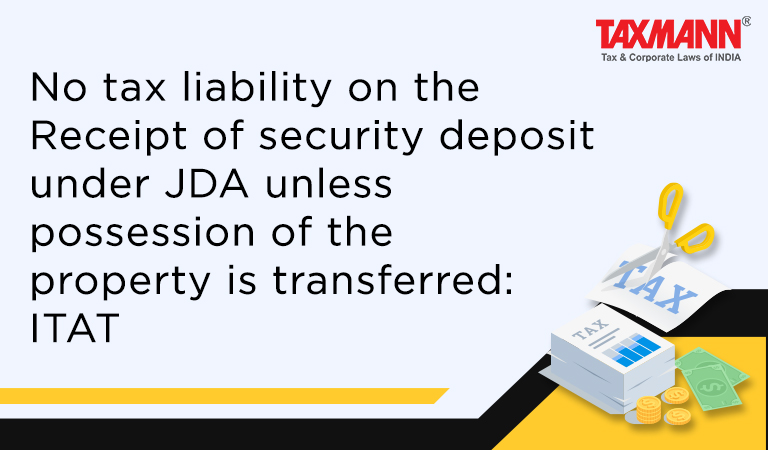No tax liability on the Receipt of security deposit under JDA unless possession of the property is transferred: ITAT
- Blog|News|Income Tax|
- 2 Min Read
- By Taxmann
- |
- Last Updated on 1 March, 2022

Case Details: DCIT v. Nagam Suguna - [2022] 135 taxmann.com 198 (Hyderabad - Trib.)
Judiciary and Counsel Details
-
- A.D. Jain, Vice President and A. Mohan Alankamony, Accountant Member
- Rajendra Kumar, CIT DR for the Appellant.
- A.V. Raghu Ram, AR for the Respondent.
Facts of the Case
The assessee entered into a development agreement and three others to extend her land for joint development with a company. The joint development agreement (JDA) stated that Rs. 7 crores was to be paid to the assessee, and possession of the property was to be handed over to the developer.
The Assessing Officer (AO) held that the transaction had culminated in the transfer of immovable property, thereby attracting long term capital gain. Accordingly, he treated Rs. 7 crores as long-term capital gain in the hands of the assessee.
On appeal, the CIT(A) upheld the order of AO. Aggrieved-assessee filed the instant appeal before the Tribunal. The assessee contended that she had only entered into JDA and didn’t transfer the immovable property as per the provisions of section 2(47) read with the Transfer of Property Act, 1882.
ITAT Held
The Hyderabad Tribunal held that the assessee had contributed her immovable property for the joint development of the property. Eventually, when her share in the developed property is sold, she will benefit from gain or loss, as the case may be, unless the assessee opts to retain the developed property.
Further, it is pertinent to mention that the amount received by the assessee of Rs. 7 crores was only an interest-free refundable security deposit for ensuring the project is completed as per the terms of the agreement. The assessee had only permitted the developer to develop the project on her land. Thus, it couldn’t be construed that the possession of the immovable property of the assessee was vested with the joint developer as per the provisions of the Act.
Considering these facts and circumstances of the case, it is apparent that the assessee shall not be liable to be taxed for entering into a JDA when neither the assessee have received any consideration nor handed over possession of the immovable property during the relevant assessment year.
Disclaimer: The content/information published on the website is only for general information of the user and shall not be construed as legal advice. While the Taxmann has exercised reasonable efforts to ensure the veracity of information/content published, Taxmann shall be under no liability in any manner whatsoever for incorrect information, if any.

Taxmann Publications has a dedicated in-house Research & Editorial Team. This team consists of a team of Chartered Accountants, Company Secretaries, and Lawyers. This team works under the guidance and supervision of editor-in-chief Mr Rakesh Bhargava.
The Research and Editorial Team is responsible for developing reliable and accurate content for the readers. The team follows the six-sigma approach to achieve the benchmark of zero error in its publications and research platforms. The team ensures that the following publication guidelines are thoroughly followed while developing the content:
- The statutory material is obtained only from the authorized and reliable sources
- All the latest developments in the judicial and legislative fields are covered
- Prepare the analytical write-ups on current, controversial, and important issues to help the readers to understand the concept and its implications
- Every content published by Taxmann is complete, accurate and lucid
- All evidence-based statements are supported with proper reference to Section, Circular No., Notification No. or citations
- The golden rules of grammar, style and consistency are thoroughly followed
- Font and size that’s easy to read and remain consistent across all imprint and digital publications are applied



 CA | CS | CMA
CA | CS | CMA
